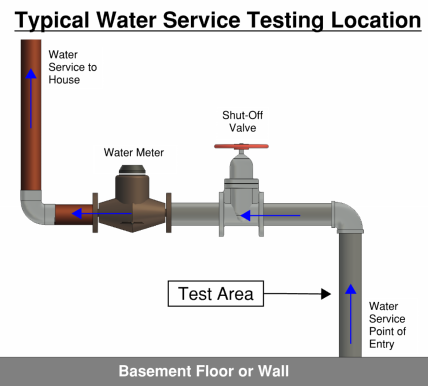
1. Your inspector will arrive between noon and 8 PM and will request access to where your water service line enters your home. Your service line carries water to your house from the water main and can typically be accessed in a basement between a wall or floor and your water meter. See the image to the right to see the area the inspector will be focused on.
Note if the pipe is covered, they may need to expose a small test area by removing paint or foam covering to expose the metal.
2. The inspector may scratch the surface of the pipe with a blunted object (e.g. coin, screwdriver, key) to observe the color of the scratched pipe. If the scratch turns a shiny silver color, it could be lead or galvanized.
3. The inspector may use a magnet to see if it is attracted to the pipe. If the magnet sticks, it is galvanized pipe.
4. The inspector may tap on the pipe to take note of the sound produced.
5. The inspector will compare their findings to the chart below to determine material.
|
|
Lead |
Copper |
Galvanized |
|---|---|---|---|
| Scratch Test Result |
Shiny silver |
Penny-colored |
Dull to shiny silver |
| Magnet Test Result |
No attraction |
No attraction |
Attraction |
| Tapping Test Result |
Dull noise |
Metallic ringing |
Metallic ringing |
Plastic is another common material that is not in this chart because it is typically easy to identify as one of the few non-metal service materials. Plastic can vary in color but is most commonly white, blue, or black.